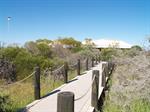Understand Sustainable Environments to Manage them Effectively!

Students who study this course benefit from the unique blend of disciplines that will provide them with the skills necessary to work in the field of environmental sustainability. This course provides a foundation in environmental ecology and conservation as well as an understanding of sustainability in relation to water, agriculture, development and energy.
Environmental Sustainability has become a major concern in recent decades, now being a guiding principle for government, business, industry and individuals all over the world. The term 'Ecologically Sustainable Development' has been coined to represent the concept of making use of our environment in a way that allows us to meet our needs without compromising the ability of future generations to meet their own needs. Sustainability experts are thus likely to be in high demand over coming decades as resources become increasingly scarce and the need to manage the effects of environmental degradation increases.

Course Structure and Content
The course comprises 4 core and 2 elective modules.
To complete the course you are required to complete six 100 hour modules.
There are four core modules. You then choose two elective modules.
Click on the links below for more information on each module. Note that each of module can also be studied as a standalone course.
How can I contribute to environmental sustainability?
Everyone can contribute toward environmental sustainability - if they know how, and are motivated to do so! This course will improve both your knowledge and motivation.
Start by Composting
We all produce waste. The things you do with waste will impact upon sustainability. Recycling waste can improve environmental sustainability, and there is no better example of that than composting.
Compost is indeed the powerhouse that improves soils and in turn powers the growth of plants. It is particularly valuable in organic growing where chemical fertilisers are not used. Its benefits cannot be underestimated:
- It improves soil structure in all types of soil.
- It provides slow release nutrients for plants to use when required.
- It increases the level of soil micro-organisms exponentially.
- Composted soils produce plants more resistant to pest and disease attack.
- Compost making is an environmentally sustainable method of recycling ‘waste’ material.
- Home-made compost is effectively cost-free.
What can be composted?
Any organic material, if left long enough, will eventually rot down due to the action of micro organisms. Composting harnesses and maximises this process; speeding up the rate of decomposition, and minimizing nutrient losses.
The raw material for good compost making is a mixture of organic materials:
- Lawn clippings
- Weeds
- Leaves
- Paper/cardboard waste
- Seaweed
- Pruning material
- Plant debris
- Straw
- Manure
- Pre-meal kitchen waste
Animal manures (sheep, cattle, poultry and horse) are a good addition in a compost heap. Compost for a minimum of six weeks to prevent burning of leaves and roots; fresh manure has high levels of ammonium (which can burn plants). Ammonium is rapidly lost during composting.
Why Study with ACS?
Design your own learning pathway.
Study at your own pace, from anywhere, at any time.
Receive prompt, expert support from our team of committed and friendly tutors.
Your learning is our priority. We are flexible and adaptable to meet your educational needs!
Enrolling is easy - just go to the top of this page and select your study method and payment option.
If you have any questions about studying with ACS, or want to know more about any of our courses, get in touch with our specialist tutors today. They will be happy to answer your questions and look at different study options to fit in with your goals.